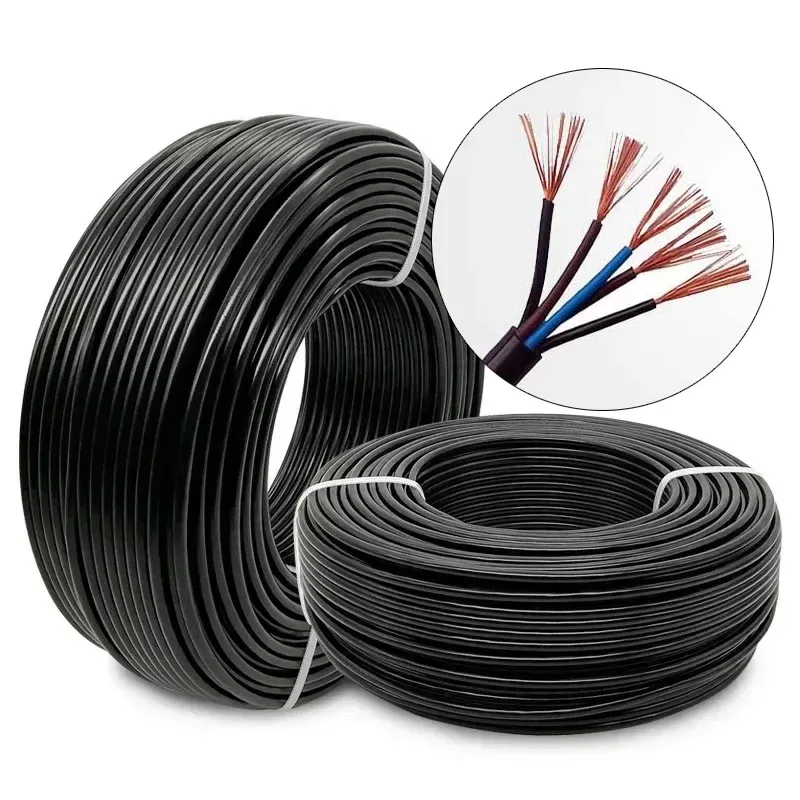
The Complete Guide to Control Cables
In today's complex industrial and automation environments, control cables play an essential role in transmitting signals and controlling machinery and equipment. Whether it's a copper control cable for electrical systems or a mechanical control cable for manual operations, choosing the right cable is crucial for safety, efficiency, and reliability.

What Are Control Cables?
Control cables are specialized cables designed to transmit control signals, data, and energy to various devices and machinery in industrial, commercial, and residential settings. They serve as a bridge between control units and operating equipment like motors, sensors, and panels.
Depending on the application, control cables can be either electrical control cables, used to transmit electrical signals, or mechanical control cables, used for manual operation of machinery parts such as throttles, brakes, and gear shifts.
Types of Control Cables
1. Electrical Control Cable
These cables are primarily used to transmit electrical control signals. They are often made with copper conductors for superior conductivity and flexibility. Electrical control cables are typically insulated with PVC, XLPE, or other materials to withstand environmental factors such as heat, moisture, and chemicals.
Common applications include:
- Industrial automation systems
- Control panels
- Conveyor systems
- Robotics
- Power plants
2. Copper Control Cable
Copper is the most popular conductor material for control cables due to its excellent conductivity, durability, and flexibility. Copper control cables are used in both low-voltage and medium-voltage systems, ensuring precise signal transmission without significant losses.
Benefits of copper control cables:
- High conductivity
- Long lifespan
- Easy to install and bend
- Resistant to corrosion (when properly insulated)
3. Mechanical Control Cable
Unlike electrical cables, mechanical control cables transmit mechanical force and motion. They are widely used in vehicles, machinery, and industrial equipment where manual operation is necessary. These cables often consist of an inner steel or stainless-steel core for strength and durability.
Common uses:
- Throttle and brake cables in vehicles
- Aircraft control systems
- Marine applications
- Heavy machinery controls
Choosing the Right Control Cable Manufacturer
When sourcing control cables, finding a reputable control cable manufacturer is essential to ensure quality, safety, and reliability. Here are some key points to consider:
- Certifications: Look for manufacturers compliant with international standards (ISO, CE, RoHS).
- Customization: Leading suppliers can provide customized cable solutions, including length, insulation, shielding, and conductor materials.
- Range of Products: A good manufacturer will offer both electrical and mechanical control cablesin various configurations.
- Customer Support: Reliable technical support and responsive customer service are crucial for long-term partnerships.
- Pricing and Delivery: Competitive pricing with timely delivery for bulk and custom orders.
Some manufacturers also specialize in copper control cables, offering additional options like shielded, unshielded, armored, and multi-core designs.
Applications of Control Cables
Control cables are used in a wide variety of industries, including:
- Industrial Automation: Connecting sensors, actuators, and PLC systems.
- Construction Machinery: Both electrical and mechanical control cables for cranes, bulldozers, and lifts.
- Transportation: Mechanical control cables for brakes, gears, and throttles in vehicles and marine equipment.
- Renewable Energy: Wiring for wind turbines and solar tracking systems.
- Home & Building Automation: Controlling HVAC systems, lighting, and security devices.
Whether you're seeking copper control cables for industrial automation or mechanical control cables for vehicle operation, understanding the different types of control cables and working with the right control cable manufacturer is key to a successful project. Quality control cables ensure efficient signal transmission, enhanced safety, and long-term reliability.
Control Cable FAQs
Q1: What is the difference between electrical and mechanical control cables?
A1: Electrical control cables transmit electrical signals for automation and control, while mechanical control cables transmit mechanical force to operate components like brakes or throttles.
Q2: Why is copper commonly used in control cables?
A2: Copper control cables are preferred for their excellent conductivity, flexibility, and resistance to corrosion. They ensure minimal signal loss and can handle higher electrical loads compared to other materials.
Q3: What are the typical applications of mechanical control cables?
A3: Mechanical control cables are used in vehicles for throttle and brake systems, in marine applications for steering and gear control, and in industrial machinery for various manual operations.
Q4: How do I choose a reliable control cable manufacturer?
A4: Look for manufacturers with international certifications (ISO, CE), a wide product range, customization services, strong customer support, and competitive pricing. Check customer reviews and case studies when possible.
Q5: Can control cables be customized for specific projects?
A5: Yes, many control cable manufacturers offer customization services, including specific conductor materials, insulation types, shielding, armoring, and required lengths to meet unique industrial needs.
-
Reliable LIYCY Cable Solutions for Low and Medium Voltage ApplicationsसमाचारJul.14,2025
-
Premium Overhead Electrical Wire Solutions for Low and Medium Voltage ApplicationsसमाचारJul.14,2025
-
Innovative XLPE Electrical Cable Solutions for Modern Low and Medium Voltage NetworksसमाचारJul.14,2025
-
High-Quality Ethylene Propylene Rubber Cable – Durable EPDM Cable & 1.5 mm 3 Core OptionsसमाचारJul.14,2025
-
Exploring the Versatility of H1Z2Z2-K 1X4mm2 Cables in Modern ApplicationsसमाचारJul.14,2025
-
Uses of Construction WiresसमाचारJul.14,2025
-
Types of Neoprene CableसमाचारJul.14,2025














